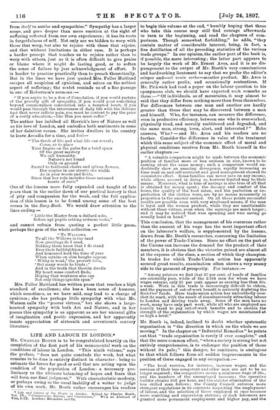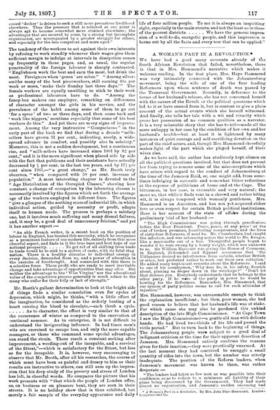LIFE AND LABOUR IN LONDON.*
Ma. CHARLES Boom is to be congratulated heartily on the completion of the first part of his monumental work on the conditions of labour in London. "This ninth volume," says the preface, "does not quite conclude the work, but what remains to be done is entirely distinct in character : being to estimate the forces for good or evil that are acting upon the condition of the population of London : a necessary pre- liminary to the ultimate balancing of hopes and fears that will form our final judgment" With characteristic modesty, 'or perhaps owing to the usual inability of a writer to judge of his own work, Mr. Booth rather encourages his readers • Life and Labour of the People in London. Edited by Charles Booth. Vol. IX.. " Comparisons. Surrey, and Cenci:mime." With an Abstract of Vols. L-LX. London : Macmillan and Co.
to begin this volume at the end, "humbly hoping that those who take this course may still find courage afterwards to turn to the beginning, and read the chapters of com-
parisons. Though somewhat forbidding," he adds, "they contain matter of considerable interest, being, in fact, a fine distillation of all the preceding statistics of the various trade groups." In our opinion, the earlier part of the book is,
if possible, the more interesting ; the latter part appears to be largely the work of Mr. Ernest Ares, and it is no dis- paragement to the output of Mr. Booth's very conscientious
and hardworking lieutenant to say that we prefer the editor's crisper and—sit venia verbo—meatier product Mr. Ayes is generally rather prolix, and occasionally sententious. If Mr. Pickwick had read a paper on the labour question to his eponymous club, we should have expected such remarks as these :—" Of individuals, as of mountains, it may almost be said that they differ from nothing more than from themselves.
For differences between one man and another are hardly greater than those that may be discovered between a man and himself. Who, for instance, can measure the difference, even in productive efficiency, between one who is overworked, physically tired, and morally embittered and degraded, and the same man, strong, keen, alert, and interested ?" Echo answers, Who ? — and Mr. Ayes and his readers are no further. Consider the difference in value of the treatment which this same subject of the economic effect of moral and
physical conditions receives from Mr. Booth himself in the earlier chapters :— " A valuable comparison might be made between the economic position of families more or less uniform in size, known to be earning about the same money ; such a comparison would un- doubtedly show an amazing divergence, rapidly increasing as time went on and self-restraint and good management showed its cumulative effect. Some families can never save on any income, while others succeed in doing so, however limited may be their means. Moreover, what is true of savings is also true of all that is obtained for money spent ; the decency and comfort of the home, the quality of the food eaten, and the perfection or im- perfection of the clothes worn, are by no means necessarily in proportion to the amount earned. On all these points successful results are possible even with very straitened means, if the man is loyal and the woman prudent, while they are unattainable without these virtues, even when the earnings are much larger; and it may be noticed that wise spending and wise saving go usually hand in hand."
This conclusion, that the management of his resources rather than the amount of his wage has the most important effect on the labourer's welfare, is supplemented by the lessons, drawn from Mr. Booth's researches, concerning the limitation of the power of Trade-Unions. Since no effort on the part of
the Unions can increase the demand for the product of their members, it is obvious that the victories gained are almost all at the expense of the class, a section of which they champion. In trades for which Trade-Union action has apparently secured great results, examination often shows a very seamy
side to the garment of prosperity. For instance :—
"Among printers we find that 37 per cent. of heads of families are ostensibly poor, while of the 2,164 men for whom we have wages returns, only 25 per cent appear as earning less than 30s. a week. Work in this trade is increasingly difficult to obtain, and the payment of out-of-work benefit is seriously depleting the Societies' funds. Here trade-union action has undoubtedly over- shot its mark, with the result of simultaneously attracting labour to London and driving trade away. Some of the men have no work, many have only part work, while all who are employed are heavily taxed to pay out-of-work benefits and to sustain the strength of the organisation by which wages are maintained at so high a level."
Mr. Booth is, indeed, inclined to doubt whether systematic organisation is "the direction in which on the whole we are moving." In the chapter on "Industrial Remedies" he points out that "trade organisation is rarely if ever complete," and that the more common effect, "when a society is strong but not
entirely comprehensive, is to endanger the position of those without its pale;" this danger, he continues, is analogous to that which follows from all sudden improvements in the position of those engaged in any occupation :—
"The local vestries, for instance, increase wages, and the services of their less competent and older men are apt to be no longer required ; the compositors secure a minimum wage of 38s., and the numbers of the unemployed increase ; the operative builder obtains 10d. per hour, and the stricter elimination of the less skilled man follows ; the County Council enforces more stringent regulations in its contraets respecting the employment of labour, and the selection of those employed at once becomes more searching and supervision stricter; or dock labourers are granted more permanent employment and higher pay, and the casual 'docker' is driven to seek a still more precarious livelihood elsewhere. Thus the pressure that is relieved at one point is always apt to become somewhat more strained elsewhere; the advantages that are secured to some, by a strong but incomplete organisation, are accompanied by a greater struggle for others, and especially for the less competent and more aged."
The tendency of the workers to act against their own interests by refusing to work steadily whenever their wages give them sufficient margin to indulge at intervals in dissipation comes up frequently in these pages, and, as usual, the regular punctuality of the foreign labourer is sharply contrasted.
• Englishmen work the best and earn the most, but drink the most. Foreigners when 'green' are sober." "Among silver- smiths many of the beat pieceworkers, still earning 40s. per week or more, make their Sunday last three days." The female workers are equally unwilling to stick to their work as professional labourers have to do. "Among the fancy-box makers one employer, remarking on differences of character amongst the girls in his service, and the prevalence of the habit among some of them to go out for a spree' of two or three days, and then come back and work like niggers,' mentions especially that some of his best workers do this." And yet there are many signs of improve.
assent. Among the very instructive " Comparisons " in the early part of the book we find that daring a decade " milk- sellers have grown 31 per cent., indicating, surely, a wide- spread advance in comfort, and possibly also In sobriety." Moreover, this is not a sudden development, but a continuous rise, and "milk-sellers have increased since 1861 by 82 per cent.," and it is the more significant when placed side by side with the fact that publicans and their assistants have actually decreased by per cent, in the last ten years, and by 17'j per cent since 1861,—" a great change," as Mr. Booth truly observes, "when compared with 50 per cent, increase of population." A most interesting chapter is devoted to the "Age Distribution of the Occupied Classes," showing how constant a change of occupation by the labouring classes is necessarily involved by the figures which set forth the average age of the workers employed in different lines. The figures "give a glimpse of the seething mass of industrial life, in which individual action, guided by necessity or profit, adapts itself to human needs. The process is perhaps a salutary one, but it involves much suffering and many dismal failures, and, it may be, a good deal of unnecessary friction," and yet it has another aspect :— " An able French writer, in a recent book on the position of labour in England, has treated this necessity, which he recognises as a prominent feature of our modern life, entirely from this more cheerful aspect, and finds in it the true base and best hope of our national prosperity To get rid of all shifting from trade to trade would be to sink to a system of caste, with its fatal stag nation. There is a healthy stimulus to individual energy in every decision, demanded from us, and a power of education in the exercise of forethought. And connected with this there is a selective force. Those profit who are ready to meet inevitable change and take advantage of opportunities that may offer. But neither the advantage to the 'Wise Virgins' nor the educational value of the competitive process generally is much solace to the many who suffer for their folly or lack of strength."
Mr. Booth's gallant determination to look at the bright side of things finds a similar consolation even for cycles of depression, which might, he thinks, "with a little effort of the imagination, be considered as the orderly beating of a heart causing the blood to circulate,—each throb a cycle.
As to character, the effect is very similar to that of the recurrence of winter as compared to the enervation of continual summer. As to enterprise, it is not difficult to understand the invigorating influence. In bad times men's wits are exercised to escape loss, and only the more capable managers, or those who command some special advantages, can stand the strain. There result a constant seeking after improvement, a weeding-out of the incapable, and a survival of the fittest,"—which is satisfactory for the fittest, but less so for the incapable. It is, however, very encouraging to observe that Mr. Booth, after all his researches, the course of which must have been as painful and dreary to him as their results are instructive to others, can still sum up the impres- sion that his deep study of the poverty and stress of London has left, in cheerful words. He compares the picture that his work presents with "that which the people of London offer, as, on business or on pleasure bent, they are seen in their streets. It is no holiday show that is thus exhibited, but merely a fair sample of the everyday appearance and daily life of four million people. To me it is always an inspiriting sight, especially in the main streets, and not the least so in those
of the poorest districts We have the general imprea- sion of a well-to-do, energetic people, and this impression is borne out by all the facts and every test that can be applied."



































 Previous page
Previous page